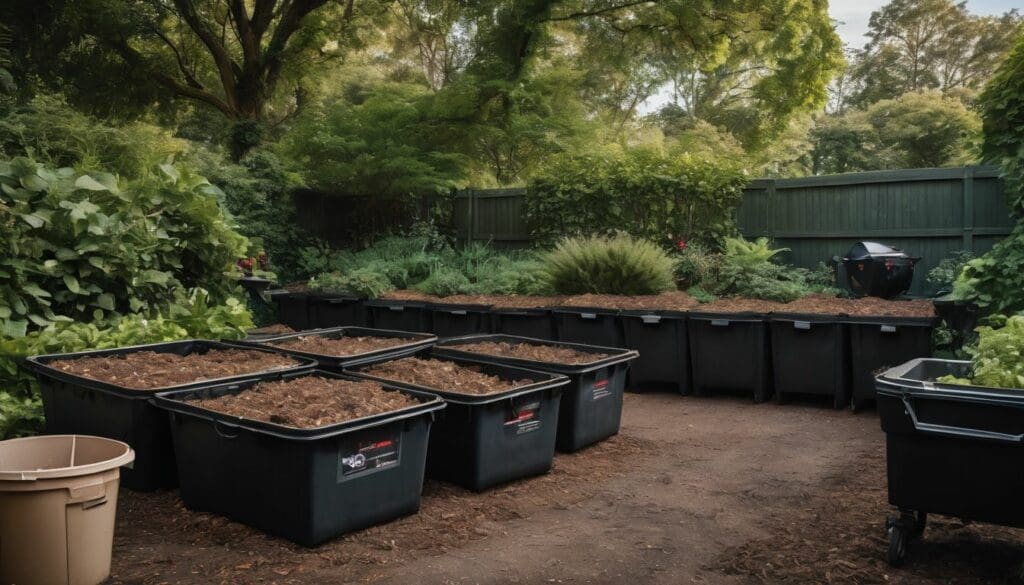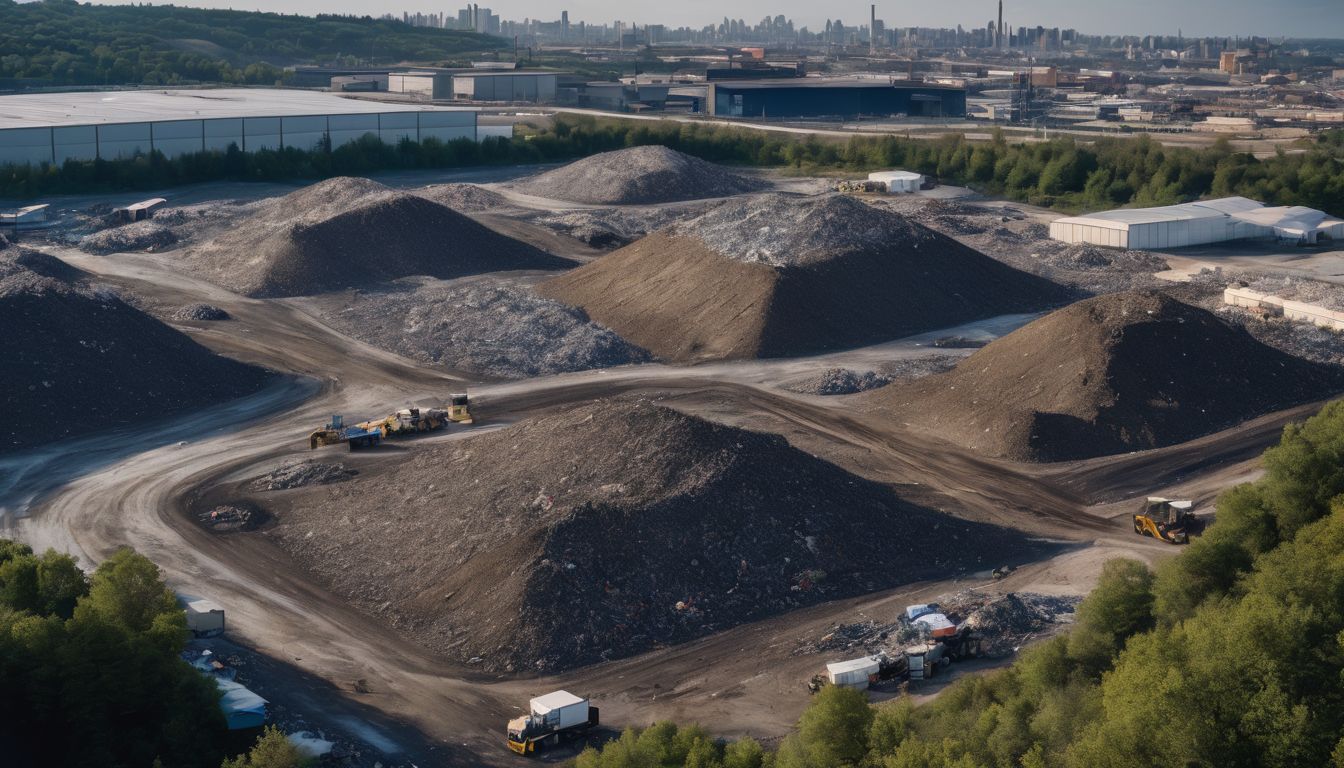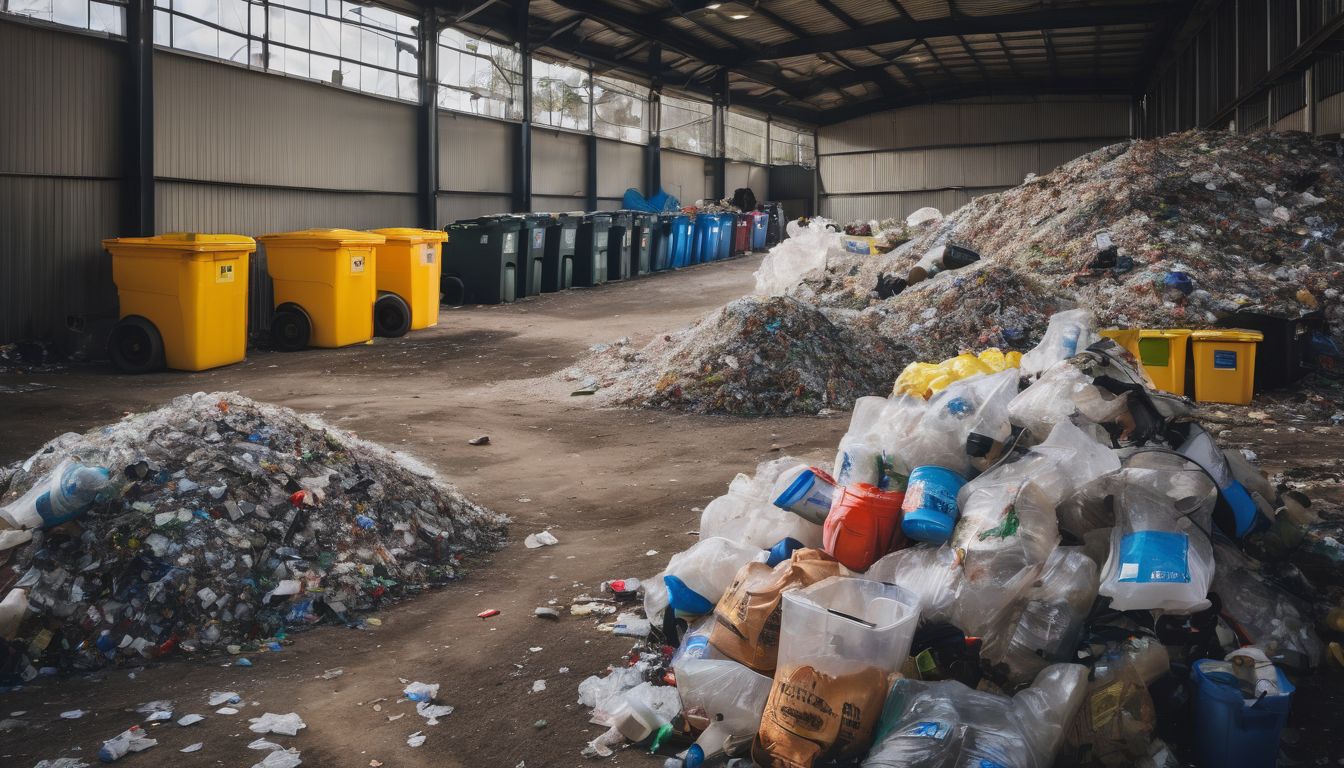Food waste is piling up, causing a stink in our communities and planet. Every year, we chuck away a third of the food produced globally. This article offers smart ways to tackle this messy issue head-on with practical solutions for recycling what we don’t eat.
Let’s dig into turning scraps into sustainability!
Key Takeaways
- Food waste contributes to significant environmental issues such as greenhouse gas emissions and the wasting of water and energy resources, while economically it causes financial losses up to billions each year.
- Solutions like composting, anaerobic digestion, and donation programs tackle the problem but face roadblocks like lack of policies, technology infrastructure, and behavioral resistance.
- Creating global policies for consistent food waste management and investing in technology can improve recycling efforts; changing individual habits is also key in reducing household waste.
The Impact of Food Waste
Food waste has significant environmental consequences, contributing to greenhouse gas emissions and land use. It also has economic implications, with the cost of wasted food reaching billions of pounds each year.
Socially, it perpetuates food insecurity and inequity among communities.
Environmental consequences
Discarded food ends up in landfills where it produces methane, a potent greenhouse gas that contributes to climate change. This process not only takes up valuable space but also releases toxins into the soil and groundwater.
Rotting food waste exacerbates air pollution and depletes the ozone layer.
Massive amounts of water and energy go to waste when uneaten food is thrown away. These resources could have been conserved or redirected to regions suffering from scarcity. Furthermore, clearing land for agriculture leads to habitat destruction and biodiversity loss, but much of this effort is wasted when the produce never reaches our plates.
Economic implications
The economic implications of food waste are significant. It leads to financial losses throughout the entire supply chain, from the farm to the consumer. In addition, there are costs associated with disposal and treatment of food waste, affecting both businesses and local governments.
These economic impacts highlight the urgency for effective solutions to reduce food waste and its associated costs.
Implementing strategies such as donation and redistribution, composting, or conversion to animal feed can help mitigate these economic consequences while also creating new opportunities for cost savings and revenue generation.
Legislation and regulations for food waste management can provide a framework for businesses to improve their practices in reducing waste generation, ultimately leading to positive financial outcomes.
Social issues
The economic implications of food waste extend to social issues, impacting communities and individuals worldwide. As substantial amounts of edible food are discarded, food insecurity persists in many regions, leaving vulnerable populations without access to sufficient nutrition.
Moreover, the disposal of food leads to a significant misuse of resources and ultimately exacerbates societal inequalities. This not only affects those directly experiencing hunger but also perpetuates systemic problems related to poverty and access to healthy sustenance.
To address these social issues, it is imperative for individuals and organisations alike to advocate for systemic changes that promote equitable distribution of surplus foods and enhance support systems for marginalised communities.
Causes of Food Waste
Food waste occurs at various stages, including the farm level, during production and manufacturing, at the retail and foodservice level, and in households. Each of these stages presents unique challenges that contribute to the overall issue of food waste.
At the farm level
Food waste at the farm level occurs due to overproduction, damage during harvesting or transportation, and cosmetic standards set by supermarkets. Farmers often discard perfectly edible produce that doesn’t meet these standards.
This results in significant food loss even before reaching consumers and contributes to environmental degradation through greenhouse gas emissions from decomposing food waste.
Farmers can address this issue by adopting sustainable farming practices such as better planning, investing in appropriate storage facilities, and selling imperfect produce for processing rather than discarding it.
During production and manufacturing
Food waste during production and manufacturing occurs due to inefficient processes, overproduction, and quality standards. Imperfect fruits and vegetables are often discarded before they even reach the market, contributing to significant food loss.
In addition, packaging and processing practices generate a substantial amount of waste in the form of plastic packaging, trimmings, and by-products. These challenges call for innovative solutions that address inefficiencies in production methods while minimising waste generation.
Modernising production techniques can help reduce food loss by optimising harvest times, improving storage facilities, enhancing supply chain management systems, and incorporating sustainable packaging materials.
At retail and foodservice level
At the retail and foodservice level, significant amounts of food waste occur due to overbuying, expiration dates, and improper handling. Supermarkets discard products that do not meet aesthetic standards or are close to their sell-by date.
In restaurants and catering services, large portions and uneaten dishes contribute to substantial waste as well.
Food wastage at these levels often goes unnoticed but significantly impacts environmental sustainability. To address this issue, innovative solutions such as dynamic pricing strategies for perishable items in supermarkets and portion control measures in foodservice establishments can help reduce waste substantially while also benefiting the environment.
In households
Households play a significant role in food waste generation. From over-purchasing at grocery stores to improper storage and meal planning, there are various reasons for food waste at home.
The lack of awareness about the environmental impact of wasting food leads to disposal rather than consumption. Moreover, inefficient cooking practices and disregarding expiry dates contribute to unnecessary wastage.
To address these issues, households can adopt simple yet impactful strategies such as proper meal planning, smart shopping habits, and utilising leftovers creatively. Additionally, raising awareness about the consequences of food waste through educational campaigns can encourage responsible consumption within communities.
Challenges in Implementing Solutions
Limited policies and regulations hinder the effective management of food waste, while the lack of infrastructure and technology presents significant barriers to recycling efforts. Furthermore, changing consumer behavior towards proper disposal and conservation is a challenge that needs to be addressed.
Limited policies and regulations
Policies and regulations play a crucial role in addressing food waste at various levels, from production to distribution. However, the current policies often lack clarity and uniformity across different regions.
As a result, there is an inconsistency in how food waste is managed and recycled. This variation creates challenges for businesses and organisations aiming to implement sustainable waste management practices.
Globally harmonised policies would provide clear guidelines for managing food waste, which could help streamline recycling efforts. Furthermore, strong legislation can incentivise industries to invest in innovative technologies for food waste recycling, leading to more comprehensive solutions.
Lack of infrastructure and technology
Limited policies and regulations have created a challenging environment for addressing the lack of infrastructure and technology needed to effectively manage food waste. Without sufficient investment in appropriate facilities and equipment, recycling and processing food waste becomes an uphill battle.
This hinders the adoption of innovative solutions that could otherwise help reduce environmental impact, maximise resource conservation, and contribute to sustainable food practices globally.
Despite the growing recognition of the importance of food waste management, without adequate infrastructure and technology in place, progress is hindered.
Lack of adequate infrastructure also impedes access to efficient methods for managing organic waste on a large scale. The absence of advanced technologies such as anaerobic digestion or industrial composting facilities limits the potential for high-volume organic waste valorisation processes.
Behavioral barriers
Despite advancements in technology and infrastructure, the successful implementation of food waste recycling solutions faces another hurdle – behavioral barriers. People’s attitudes and behaviours towards food waste disposal and recycling play a significant role in its effective management.
Changing ingrained habits, raising awareness about the impact of food waste on the environment, and promoting sustainable practices can help overcome these behavioral barriers. Encouraging individuals to alter their approach to purchasing, storing, and consuming food will be pivotal in achieving widespread success in reducing food waste.
Educating communities about simple yet impactful changes they can make at home is crucial. By emphasising the environmental benefits of reducing food waste, individuals can be inspired to take action within their households—effectively contributing to a global solution for this pressing issue.
Potential Solutions for Food Waste Recycling
Donation and redistribution, composting and anaerobic digestion, conversion to animal feed, thermochemical processes, and Extended Producer Responsibility (EPR) programs are all potential solutions for food waste recycling.
These methods can help reduce the environmental impact of food waste while also creating economic and social benefits.
Donation and redistribution
Food donation and redistribution are vital strategies to reduce food waste and address food insecurity. By donating surplus food to charities, shelters, and community organisations, we can help feed those in need while diverting edible food from landfills.
Food banks play a crucial role in redistributing excess perishable items to the needy, contributing to both environmental sustainability and social welfare.
Efforts should be made to raise awareness about the benefits of food donation among individuals, businesses, and communities. Establishing efficient logistics for collecting and distributing surplus food is essential for successful redistribution efforts.
Encouraging collaboration between retailers, restaurants, and local charities can enhance the effectiveness of these programs.
Moving forward
Composting and anaerobic digestion
Composting and anaerobic digestion offer efficient ways to recycle food waste. Through composting, organic material is decomposed into nutrient-rich soil conditioner using natural processes.
Anaerobic digestion breaks down biodegradable material in the absence of oxygen, producing biogas and biofertiliser as by-products. These methods not only divert food waste from landfills but also generate valuable resources for agricultural use, offering a sustainable approach to managing organic waste.
Implementing composting and anaerobic digestion at various levels of food production and consumption can significantly reduce environmental impact while creating opportunities for circular economy practices.
Conversion to animal feed
After food waste is processed through composting and anaerobic digestion, another effective solution involves converting it into animal feed. This process helps to repurpose food waste by turning it into a valuable resource for livestock.
By using advanced technologies, companies can efficiently transform food waste into nutritious animal feed, contributing to the circular economy while reducing the environmental impact of wasted food.
Through this approach, organic materials that would have ended up in landfills are instead utilised to support sustainable agricultural practices and reduce the demand for virgin resources.
Thermochemical processes
Thermochemical processes offer an efficient way to recycle food waste. Through this method, organic matter is converted into energy, biofuels, and valuable chemicals through high-temperature reactions.
This process helps in reducing the environmental impact of food waste while producing renewable energy and other useful by-products. Thermochemical processes also contribute to reducing greenhouse gas emissions, minimising reliance on fossil fuels and promoting a more sustainable approach to managing food waste.
By implementing thermochemical processes for food waste recycling, we can significantly decrease the amount of waste sent to landfills while simultaneously harnessing its potential as a valuable resource.
Extended Producer Responsibility (EPR) programs
Extended Producer Responsibility (EPR) programmes hold manufacturers accountable for the entire lifecycle of their products, including end-of-life disposal. This encourages companies to design products with recycling in mind and motivates them to invest in more sustainable practices.
EPR programmes also help shift the responsibility and cost of managing waste from local governments and taxpayers to producers, promoting a circular economy while reducing environmental impact and creating new opportunities for food waste valorisation.
Under EPR programmes, producers are incentivised to minimise packaging materials, reduce food waste at the source, and implement efficient recovery systems. This approach not only addresses the challenges associated with food waste but also drives innovation towards more environmentally friendly packaging solutions and production processes.
Conclusion and Call to Action
In conclusion, addressing food waste requires a collective effort at every stage of the supply chain. We must implement policies that support reduction and recycling efforts. Individuals can also make a real impact by reducing their own food waste and supporting initiatives in their communities.
It’s time to take action to minimise the environmental, economic, and social impacts of food waste.
FAQs
1. What are the main challenges of recycling food waste?
The main challenges include managing the valorisation of food waste, improving processing and packaging to reduce loss, and adhering to food waste policy and legislation.
2. How can we find solutions for food waste globally?
We can tackle this issue by investing in technology that targets food loss reduction, creating global strategies for recycling, and encouraging responsible consumption.
3. Is there any legislation focused on reducing food waste?
Yes, various countries have introduced specific policies and legislation aimed at guiding businesses and consumers towards more effective ways of handling their food waste.
4. Can you give some examples of how to recycle or use wasted food?
Food can be recycled into compost for agriculture or converted into energy through anaerobic digestion; moreover, innovative approaches are being developed to repurpose what would otherwise be wasted into new products.





